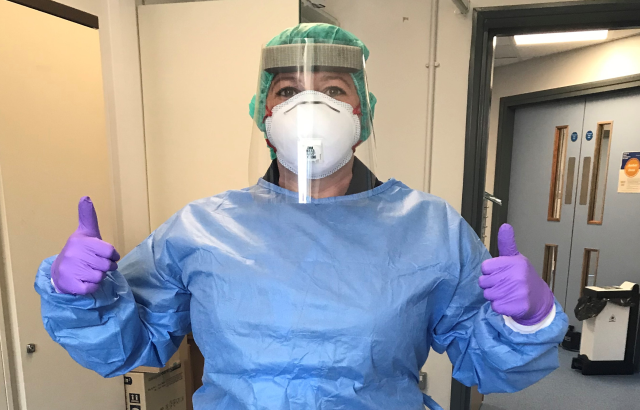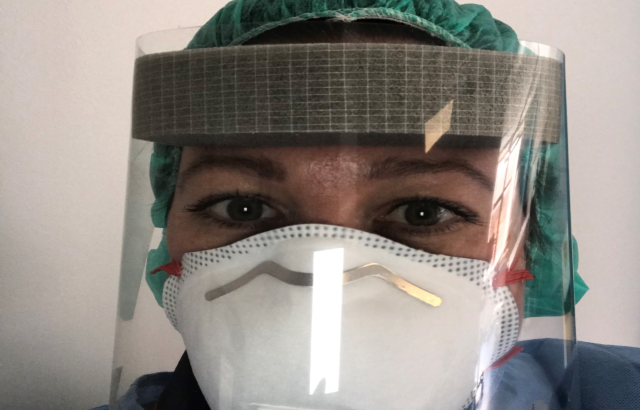

Thousands of former nurses, doctors and healthcare workers have been told ‘the NHS needs you’ in a recruitment drive to support the fight against coronavirus (Covid-19).
Colleagues who had left the NHS in recent years have been asked to ‘stand up, step forward and save lives’ to help the health service tackle the greatest global health threat in a century.
One of those who answered the NHS’s call was Victoria Meynell, a cardiac nurse who works in the British Heart Foundation’s Health Service Engagement Team. A former NHS nurse, Victoria applied to help – and earlier this month she spent her weeks’ annual leave working her first clinical shifts on a hospital ward in 10 years.
Victoria has shared her experience of spending a week on the frontline, where she cared for people affected by Covid-19.
Victoria's story

When I applied to join the frontline, I went into autopilot mode. I had seen the news about Covid-19 and the pressure it was putting on the health service, so I just felt compelled to help and had the skills to do so. The process to sign up through NHS Professionals was very simple and after I had completed some online training, I signed up for four shifts at a local hospital trust.
Before I started my first shift, I did feel anxious. I was assigned to a Covid-19 ward on my first day. I was kitted out in PPE, which included a gown, visor, facemask, gloves and a haircap.
I took handover from a nurse who explained that the patients in the ward had all tested positive for the virus. The ward had mainly elderly patients with complex needs, many of which had DNAR (Do Not Attempt Resuscitation) care plans in place and therefore their treatment would not be escalated to ICU if they became more unwell.
The ward was made up of six bedded bays which were closed off to a central station. The patients were not able to leave the bays and were restricted to getting up and walking around their beds only. It was back to basics ‘hands on’ nursing care – we’d be making sure the patients were comfortable, clean, fed and watered and would also give them their medication.
Incredible sense of pride
I received handover and the nurse told me about one elderly lady who was very poorly. Her care plan had now changed to end of life care, and we were delivering supportive care to keep her comfortable in her last days of life. Within 90 minutes of my first shift, I held her hand as she passed away.
Due to visiting restrictions, no family could be with her. It was extremely sad that she couldn’t have her relatives around her at a time like that. However, I did feel this incredible sense of pride and I was humbled that I was able to be there with her and to comfort her. Another nurse phoned her relative to explain that she had passed away and they told the nurse that they were comforted by the fact that someone was there with her to hold her hand during her last breaths.
Being back on the wards was eye-opening. There was a sombre tone throughout, and it brought home how serious the situation is. There were nurses and staff who had been redeployed from other departments and were understandably anxious at being in a completely new environment.
But what shone through for me was the sense of camaraderie on the ward. Everyone is truly in it together and was devoted to giving the best care they could, even in the tragic circumstances we were all facing.
Distancing from family

My shifts were split so I worked two days on the coronavirus ward, and the final two days in a unit which had been turned into a second A&E in response to Covid-19. Here, we would treat patients with respiratory problems who were suspected of having Covid-19.
The patients were mainly aged 60 or over. The hardest part was seeing a previously healthy patient who was still able to drive, go shopping and pretty much live a relatively normal life, struggling after being struck down by the virus. This showed that the virus does not discriminate.
The thought of contracting Covid-19 did play on my mind. The biggest fear I had was passing it to my three children and my husband. When I arrived home from work each day, I’d undress at the door and throw all the clothing in the wash. My family knew to leave the door unlocked for me and to make sure that all the doors I would need to walk through to get to the shower were open. If I touched any handles or surfaces, I’d need to disinfect them.
I started to feel quite sick after my first two shifts and struggled to shake that feeling away. That concerned me and I began distancing from my family as a precaution. But when I mentioned this to another nurse, they said they had felt the same symptoms too, and that this was probably because of the facemasks we had to wear. After completing my shifts, I’ve been mentally counting down the next two weeks, hoping that I don’t get any symptoms.
Reassure other medical professionals
In those four days in hospital, I managed to see both ends of the spectrum – from people presenting with symptoms at the ‘front door’ through to holding someone’s hand as they sadly passed away.
I look back at my experience and I am incredibly humbled to have been a part of a team who were doing their very best in the surreal situation we were in. The real heroes are those I was working with, who are doing it day in and day out.
I also hope my experience helps to reassure other medical professionals who are perhaps anxious about going onto the frontline – you’ll get the support you need and you’ll be making a real difference.


